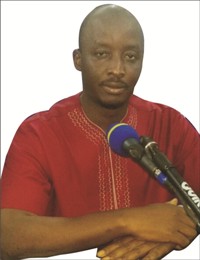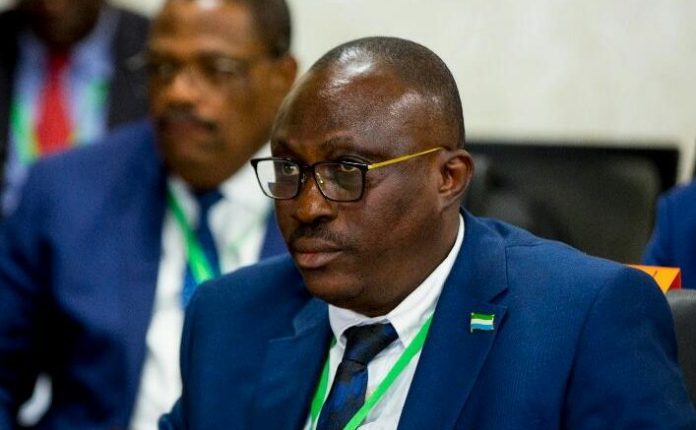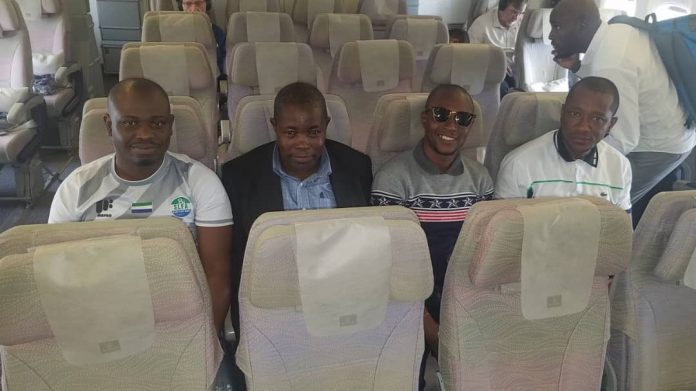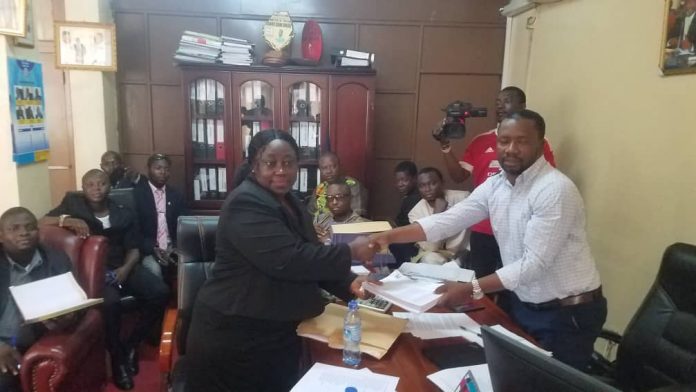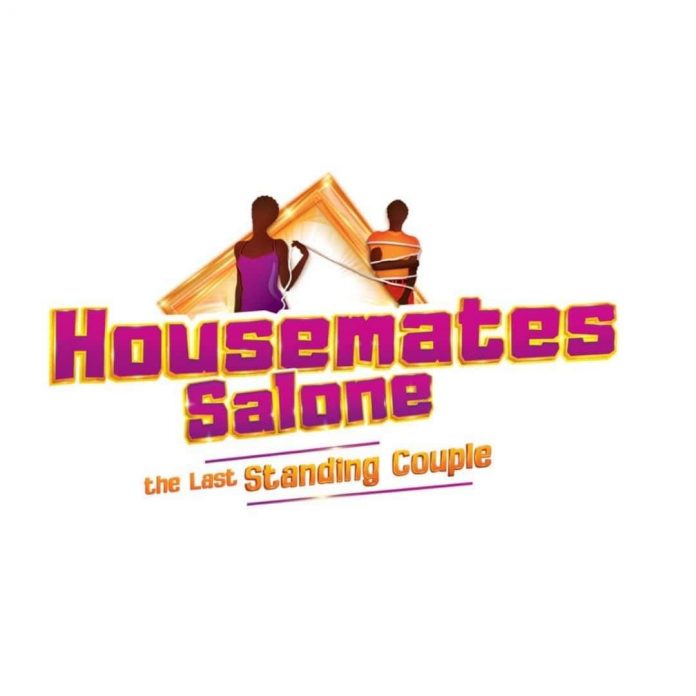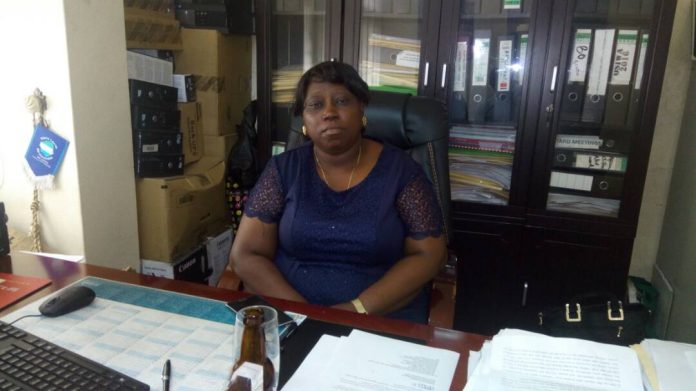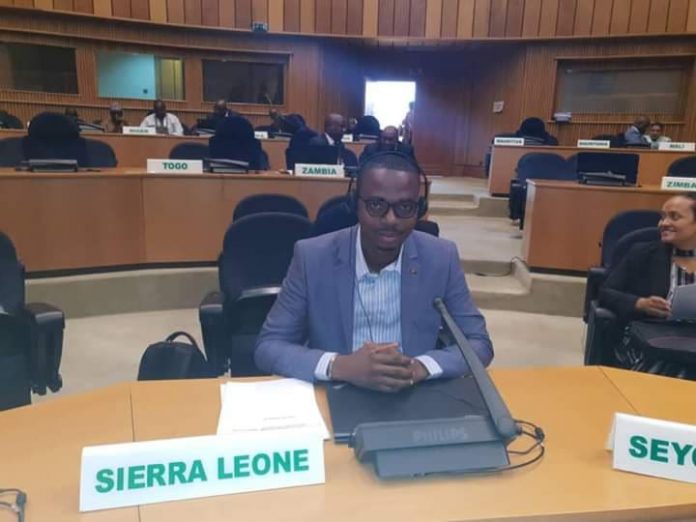National Petroleum (NP) Sierra Leone Limited is flying this nation’s flag in Guinea, Liberia, The Gambia and Ivory Coast where it is doing remarkably well. The company is operating effectively well in these countries, proving jobs for many, as well as revenue to the Governments through the timely payment of taxes.
Established by certain Sierra Leoneans years back, NP has grown to become one of the most successful indigenously owned companies in this country. Because of its strength through effective management, the company was able to open branches in the aforementioned West African States.
An outstanding reason which could be stated why this indigenous company is making exceptional inroads is simply because customer care is always taken paramount; always ensuring that customer satisfaction is prioritized. The company truly deserves commendation in that direction.
With well-motivated members of staff who know how to efficiently treat customers, NP has become very endearing to many.
In all the five countries where NP is operating, the company always ensures that petroleum products in terms of fuel and other lubricants are available in order to avoid shortage taking place.
Enabling their customers to purchase fuel using NP smart cards is making use of latest technology to avail their customers to conveniently do transactions. This has increased easy accessibility contrary to unnecessary spending of time to purchase these petroleum products at different filling stations.
It has been established that using charcoal and wood for cooking purposes poses health hazards and depletion of our forests. Against such a backdrop many have commended the company for making it possible to get access to NP gas cookers, which are indeed safe and friendly for domestic use. Gas is as well available at the company\s filling stations which residents in these five West African countries can purchase at affordable prices.
At most of their filling stations there are mini marts, where various goods are sold making it possible for customers to easily procure them after purchasing fuel. Even if an individual does not go there to purchase fuel, he or she can conveniently purchase what he or requires from the mini mart.
NP Limited has truly made Sierra Leone proud as it continues to fly the Green, White and Blue in West Africa with the story of how we indeed have capable entrepreneurs.
NP Flies Sierra Leone’s Flag in West Africa
The $5M Paid To Gento By RMFA… The Public Must Not Be Misinformed
When President Donald Trump asked the United States Senate to grant him permission to build the wall along the border with Mexico and Congress refused, what did he do, which is absolutely legal and within the law to get the money to start building the wall?
Give a dog a bad name in order to kill it, is what the enemies and detractors of Mohamed Gento Kamara want to do to him, in spite of abundant evidence that the country’s most patriotic roads contractor, like Donald Trump, never had any malicious intent to defraud the Government and people of this our beloved country.
Admitted that the then Director General of the Road Maintenance Fund Administration went outside of his official remit of extending a credit of USD5 Million to Betton Ville, Gento’s parent road construction company, as reported by the Auditor General’s Office.
What however is not stated, but was made abundantly clear was that the Government, which at the time was financially constrained, did the expedient thing to order the RMFA through the Ministry of Finance to extend the USD5 Million credit to Gento’s company, in lieu of a 30% advance owed his company for ongoing road work.
As such, documentary evidence has proven beyond all reasonable doubt that Mohamed Gento Kamara, the Chief Executive Officer of Gento Group of Companies, is not indebted to Government to the tune of USD5 Million as it is being peddled by certain mischievous rumor mongers and saboteurs.
When the Audit Service recommended that the transaction was not within the remit of RMFA, even though authorized by the then Government, and for the money to be returned to the Consolidated Revenue Fund, again, the Government and RMFA did what was expedient; they allowed Gento to use it as advance payment for the Waterloo township roads contract that his company had won. This is very simple to understand that nothing criminal was done by Gento, and for that matter, even the Government and RMFA.
It should not come as any big surprise that in this country certain people become very jealous of individuals who are progressive and will go to extreme lengths to pull them down for no just reason (s) other than mere envy.
Reference could be made to individuals like Sam King who was running a successful stationery business entity, an importer and retailer of basic goods Med T, Paul Francis (Elder brother of the Chief Minister), who was on the verge of facilitating the establishment of a commercial bank in this country, but prevented from doing so and a host of others were all undermined and destroyed.
This trend of sabotaging successful entrepreneurs has been seriously derailing development. What has been really established as an indisputable fact is that moves made by certain ill motivated individuals to pull down progressive individuals and entrepreneurs have been and is definitely bringing the country down and not directly the individuals targeted.
The simple fact that these individuals are helping in the areas of providing jobs for many Sierra Leoneans, paying taxes to Government means that they are contributing positively towards economic development and poverty reduction. What if they decide to fold up their businesses? Then it is possible that it will result in many becoming jobless thereby accentuating massive hardship and poverty.
The crux of the matter is that there was a Memorandum of Understanding wherein, SLRA which is the parent body of RMFA agreed to fund road contractors on behalf of the Government of Sierra Leone.
SLRA through RMFA was to pay Gento 30 percent advance for the Waterloo township roads project. The amount should have been Le12.8 billion. Gento received Le7.8 billion.
The balanced account remained with RMFA which had the onus of reconciling its books with the Ministry of Finance. RMFA was insisting that the Ministry of Finance should hand over the balance to them, but they were refused on the grounds that it was Government money and they were not entitled to it. What Gento was paid as advance is clearly recorded at the Accountant General department and with his bank. He was to receive USD12.8 million, but he received less and not in dollars but in Leones.
What some are failing to realize is that strict adherence and proper use made of the Local Content Policy could be the engine for overall national development. Mohamed Gento Kamara is a very good example of an ambitious indigenous businessman who has been doing extremely well in terms of constructing and rehabilitating qualitative roads in different parts of the country. He has helped in the direction of job creation that has improved standards of living of many families as well as timely payment of taxes.
It will therefore be understandable that his successes may not go down well with certain people, who will not spare any opportunity to defame and smear his good image, but there is a popular belief that he who God has blessed cannot be easily destroyed.
Gento is really unperturbed and cannot be shattered by detractors, who have been politically castigating him.
Bread And Butter Crises… The People Say JJ Saffa-Economics Not Working
Many developing nations are in debt and poverty partly due to the policies of IMF and the World Bank. By and large, their programs have for the past fifty years resulted in poverty and debt and increased dependency on the richer nations, despite the IMF and World Bank’s claim that they will reduce poverty.
Following an ideology known as neoliberalism, and spearheaded by these and other institutions known as the Washington Consensus (for being based in Washington D.C.), Structural Adjustment Policies (SAPs) (even though modified in the 21st century) have been imposed to ensure debt repayment and economic restructuring.
But the way it has happened has required poor countries to reduce spending on things like health, education and development, while debt repayment and other economic policies have been made the priority. In effect, the IMF and World Bank have demanded that poor nations lower the standard of living of their people.
A Spiraling Race to the Bottom
The IMF and World Bank provide financial assistance to countries seeking it, but apply a neoliberal economic ideology or agenda as a precondition to receiving the money. For example:
• They prescribe cutbacks, liberalization of the economy and resource extraction/export-oriented open markets as part of their structural adjustment.
• The role of the state is minimized.
• Privatization is encouraged as well as reduced protection of domestic industries.
• Other adjustment policies also include currency devaluation, increased interest rates, flexibility of the labor market, and the elimination of subsidies such as fuel and food subsidies.
• To be attractive to foreign investors, various regulations and standards are reduced or removed.
The impact of these preconditions on poorer countries can be devastating. Factors such as the following, lead to further misery for the developing nations and keep them dependent on developed nations:
• Poor countries must export more in order to raise enough money to pay off their debts in a timely manner.
• Because there are so many nations being asked or forced into the global market place—before they are economically and socially stable and ready—and told to concentrate on similar cash crops and commodities as others, the situation resembles a large-scale price war.
• Then, the resources from the poorer regions become even cheaper, which favors consumers in the West.
• Governments then need to increase exports just to keep their currencies stable (which may not be sustainable, either) and earn foreign exchange with which to help pay off debts.
• Governments therefore must:
o spend less
o reduce consumption
o remove or decrease financial regulations and so on.
Over time then:
o the value of labor decreases
o capital flows become more volatile
o a spiraling race to the bottom then begins, which generates
o social unrest
• These nations are then told to peg their currencies to the dollar. But keeping the exchange rate stable is costly due to measures such as increased interest rates.
• Investors obviously concerned about their assets and interests can then pull out very easily if things get tough
o In the worst cases, capital flight can lead to economic collapse, such as we saw in the Asian/global financial crises of 1997/98/99, or in Mexico, Brazil, and many other places. During and after a crisis, the mainstream media and free trade economists lay the blame on emerging markets and their governments’ restrictive or inefficient policies, crony capitalism, etc., which is a cruel irony.
• When IMF donors keep the exchange rates in their favor, it often means that the poor nations remain poor, or get even poorer. Even the 1997/98/99 global financial crisis can be partly blamed on structural adjustment and early, overly aggressive deregulation for emerging economies.
• Millions of children end up dying each year.
What is the IMF/World Bank Prescription?
As economist Robin Hanhel summarizes:
The IMF has prescribed the same medicine for troubled third world economies:
• Monetary austerity. Tighten up the money supply to increase internal interest rates to whatever heights needed to stabilize the value of the local currency.
• Fiscal austerity. Increase tax collections and reduce government spending dramatically.
• Privatization. Sell off public enterprises to the private sector.
• Financial Liberalization. Remove restrictions on the inflow and outflow of international capital as well as restrictions on what foreign businesses and banks are allowed to buy, own, and operate.
Only when governments sign this structural adjustment agreement does the IMF agree to:
• Lend enough to prevent default on international loans that are about to come due and otherwise would be unpayable.
• Arrange a restructuring of the country’s debt among private international lenders that includes a pledge of new loans.
ECOWAS Court Delegation Dialogues with Chief Justice
Hon. Justice Desmond Babatunda Edwards, who is the Chief Justice of the Republic of Sierra Leone on t Friday 15th March 2019, held dialogue meeting with the President, Judges and support staff of the ECOWAS Community Court at his chambers, Main Law Court Building, Siaka Steven Street in Freetown.
Speaking to the Hon. Chief Justice and other Judges of the Superior Court of Judicature, the President of the Court Hon. Justice Edward A. Asante said the ECOWAS Community Court of Justice is an organ of the Economic Community of West Africa States (ECOWAS), a regional integration community of fifteen (15) member states in Western Africa. He revealed that the Court was created pursuant to the provisions of Article 6 and 15 of the Revised Treaty of the Economic Community of West Africa States (ECOWAS).
Commenting on the jurisdiction and enforcement of the Court, President Edward A. Asante said, the court deals with administrative tribunal for ECOWAS, human rights, arbitration and inter-state dispute resolution tribunal. He said the court also consider cases brought by individuals on application for relief for violation of human rights, individual and cooperate bodies to determine as to whether their rights have been violated by an ECOWAS official etc.
He said the decision of the court is final and enforcement of court’s decisions has been one of the biggest challenges. Hon. Justice Edward A. Asante said enforcement of Court’s decisions is one of the reasons for their trip to Sierra Leone. He said Article 24(4) and (3) of the Supplementary Protocol of the ECOWAS Court provides that “Execution of any judgment of the Court shall be in the form of a writ of execution, which should be submitted by the Registrar of the Court to relevant member State for execution according to the rule of civil procedure of that member state.’ He said execution is done upon verification by the appointed authority of recipient that the writ is from the court and the writ shall be enforced.
Hon. Justice Edward A. Asante beseeched the Hon Chief Justice to meet with the Attorney General and Minister of Justice to select someone who will be approved to serve as focal person, and whose job will be to enforce orders of the court.
In his comment, the Hon Chief Justice Hon. Justice Desmond Babatunda Edwards thanked the President and team from the ECOWAS Community Court for what he described as timely and educative dialogue. He affirmed that he himself and other judges had learned so much on the operations of the court and that they now have the appetite to go more into the ECOWAS Court and its operations. He promised the team that he will ensure that, their request is effectively communicated to the relevant Ministries so that enforcement concerns will be addressed. The dialogue meeting ended with photos taken.
Hon. Justices of the ECOWAS Community Court posed with Sierra Leone Chief Justice and Judges of the Judiciary of Sierra Leone.
Kenya & Ghana to serve as Case Studies for Youth Affairs
In a new development Lusine Kallon the Deputy Minister of Youth Affairs led a delegation to Kenya and Ghana ahead of the review of the National Youth Service (NYS) Act, which was legislated in 2016.
The team comprises Hon. Abdul Kargbo-Chairman of the Parliamentary Committee on Youth Affairs, NYS Board Chairman Sahr Nyaama and the NYS Deputy Executive Director Onanah Jalloh.
The NYS study tour to Kenya and Ghana is to inform the review of the 2016 NYS Act, as proclaimed by President Julius Maada Bio in his maiden address to Parliament on 10th May 2018.
The choice of Kenya and Ghana is meant to obtain best practices from the youth services of both countries and to further obtain all technical information and literature that would enhance the implementation of the scheme in Sierra Leone.
Minister Kallon said the New Direction believes in effective institutional reforms that will resonate with youth empowerment and national development. According to him, this will help the Government to implement programmes and projects in line with its national agenda.
“The study tour is important and timely,” said Minister Kallon, “it will help us to obtain best practices and lessons from other countries ahead of the review process.”
Onanah Jalloh, Deputy Executive Director of the NYS said they are on track and working assiduously to ensure that the NYS becomes an envy in the sub-region. He said since inception, the NYS was dormant but they have injected a “new blood” into the scheme to achieve President Bio’s ambitious vision for the youth.
“We were able to recruit the first batch of graduate corps and today they have been deployed across the country,” said Director Jalloh.
He went on to state that after the tour they would certainly review the Act which is why they are travelling with the Chairman of the Parliamentary Committee on Youth Affairs to demonstrate seriousness.
2,475 clique members to be Empowered
On Friday, 22 March 2018 the Legal Aid Board fulfilled a promise it made to clique members – a few of who were female sex workers – during the March 2018 elections by handing over two thousand four hundred and seventy-five (2,475) names of cliques member to the Youth Minister, Hon. Mohamed Orman Bangura for inclusion into one of the youth projects of the Ministry. Only 2% of those on the list are above thirty-years. The list also contains contact details including mobile numbers of clique members and their Five-Os.
The ceremony took place in the office of the Minister in the Stadium Hostel in Freetown.
As part of the initiative at ensuring Free, fair, credible and peaceful elections, the Board held sensitization meetings with Cliques in the Solidarity Hall of the Sierra Leone Labour Congress. These meeting took place in the period leading to the March 2018 elections. It was during these engagements that the ‘Crime to Career’ initiative was borne as part of a post office initiative for cliques.
The clique members had asked for something in return. They wanted to acquire skills that will give them a sustainable livelihood, so they will not have reason to resort to crime to make ends meet. “During these meetings, I was confronted with the question: ‘Mummy what are you going to do for us? and this really pricked my conscience,” she said.
Executive Director of the Legal Aid Board, Ms. Fatmata Claire Carlton-Hanciles said the Board’s Anti-Election Violence Initiative was support from the United Nations Development Programme (UNDP). ‘As a result of the support, the Board was able to train staff and partners, organized sensitization meetings on the electoral laws and engage with the electoral process.
She said she was pleasantly surprised to find out one clique member on the list was a degree holder. Some had Higher Teachers Certificate (HTC) while others had certificates in accounting and Information Technology. Also, there are those who have acquired skills in carpentry, painting and driving.’
The names which were drawn from over thirty-two clique groups were compiled by Paralegals of the Board. These include Bloodline of Smart Farm, Blue Flag of Mountain Cut, Gaza State of Hill Cut Road, Central Ross of King Jimmy, Orlorshoraw of Murray Town and KKK of Mount Aureol
Ms. Carlton-Hanciles said the Board targeted the cliques because they are among the most prone to violence. Most importantly, based on reports of violence perpetrated by cliques in December 2017 the Board decided to engage them through meetings to sensitize them on the electoral laws and also ensure they engage with the electoral processes. The Board also maintained regular contacts with them through Paralegals assigned to the various clique groups in the Western Area.
‘The wakeup call came, when some former clients of the Board were arrested for perpetrating election related violence,’ Ms. Carlton-Hanciles said. ‘Also, being one of the focal institutions for Goal 16 of the Sustainable Development Goals which speak to promoting peaceful and inclusive societies for sustainable development, we were obliged to do something.’
Ms. Carlton-Hanciles said the Minister has brought a breath of fresh air into the job because he is seen by youths as a role model and not as a Minister. ‘You are a young man who has gone through what these cliques are now going through and have been able to turn around your life for the better,’ she said.
The Minister of Youth, Hon. Mohamed Orman Bangura described what the Board has done as a ‘job in the right direction’.
He said a lot of factors are responsible for what the cliques are going through at the moment, part of which has to do with the fact that they have been ignored for too long. ‘We all have a role to play to turn their lives around and this is why the efforts of the Legal Aid Board in this direction should be commended,’ he said. ‘We should stop seeing youths as a liability. This is why we have to change the narrative and also help change their mindsets.’
He said his Ministry is committed to ensuring youths have the mindset to succeed. He noted that if the youths cannot make a better future when they are young, there will be nobody to take care of them when they are old. ‘This is why we are investing in them and we will ensure we account for any penny that comes to my Ministry,’ he said.
The Minister emphasized that team work is required at all levels to achieve the desired results. ‘The New Direction believes in team work and this is why we work as a team in my Ministry,’ he said.
He underscored the need to be serious about the fight against corruption to ensure resources for youth empowerment are not diverted into personal use. He also lamented the effect of drugs on young people. ‘When we came ito power Tamadol was selling for two thousand Leones (Le2,000) now it is going for five thousand Leones (Le5,000) and ironically it has boosted its consumption.
Mr. Bangura said his Ministry has developed programmes aimed at changing the lives of the youths. He said 10 Car Wash projects have already been launched in Freetown. He added that more will follow in the coming months. Also, the National Youth Service is ongoing. He noted that over 1000 more youths will be recruited into the scheme this year.
Projects lined up for the coming months include Youth in Commercial Transportation, Youth in Fisheries, Youth in Agriculture and the Entrepreneurship programme. He disclosed that the Ministry will be giving out 200 vehicles to youths as part of the Youth in Commercial Transpiration. Also, it will tap into the huge agriculture potential in Tormabom by having youths go into farming in that part of the country.
The meeting was climaxed with the handing over of files containing the names of 2,475 clique members from 32clique groups to the Minister of Youth by the Executive Director of the Legal Aid Board.
Housemates Salone Continues to Hold Viewers Captive
2019 Housemates Salone Reality TV Show is becoming more and more funny, and lively with interesting episodes that provokes laughter amidst the lot of gossips , display of seniority by the various competitors, each trying to outwit the others in order to capture the votes of viewers who have been offered the freewill to do so using Africell Number 5500. The character attacks, singing, attempts made to act funnily, talk tough and appear sexy may only be interpreted within the context of demonstrating strong language, behaving humorously and displaying nudity as the competition demands. It is indeed laughable to see the Housemates dancing to Sierra Leonean tunes, cracking jokes and arguing.
The live Reality Show, which is aired on AYV entertainment Channel 34 Television station is indeed a new development in this country for which the organizers AYV Media Empire and Africell have been widely hailed as both continue to boost the entertainment industry,
What is playing in the minds of the current 12 Housemates ,the number was increased by adding two former evicted contestants to the 10 that successfully survived the past evictions, is emerging winner to bag the Le100,000,000 that has been put aside as the star prize,
According to the organizers of the interesting and somehow comical show what is at the centre of organizing the show is youth empowerment, providing a platform to showcase their talents and at the same time to learn new skills like learning how to cook, socialize, how to play certain games, build confidence, how to comport themselves publicly and to speak fluently, They have been benefitting from interactions with officials of certain corporate entities, like Rokel Commercial and Guarantee Trust Banks who have been explaining to them how their institutions operate,
One outstanding thing that the show has elicited is that the sky could be the limit for any individual regardless of whether a person is able and disable, One of the Housemates, Bintu, a blind young girl, has been acting admirably well to the consternation of most viewers, It is unbelievable that she is comfortably interacting with the other contestants, AYV and Africell has reiterated that disability could not mean inability and we must draw a lesson from that,
It may be subject to argument as to whether the way the Housemates are catered for falls under empowerment because they are offered good food and drinks nurturing them well, Indeed, a good health produces a sound mind, The fact remains that the Housemates are really enjoying sumptuous food,
AYV, under its astute Chief Executive Officer, Ambassador Anthony Navo, has been at the very forefront of empowering young people and make them very productive in society. He has been doing so passionately and he is highly respected for championing that cause.
A good aspect of the Reality TV Show is that it has exposed all the participants and as viewers continue to follow it there is the likelihood that in the future some of them will become Brand Ambassadors, artists or models, It can never be an overstatement to state that Housemates Salone indeed continues to thrill viewers and hold them captive.
NP Ltd Ranks Top in 5 West African Countries
One of the leading companies, the National Petroleum (NP) Limited is remarkably doing well in Sierra Leone, Guinea, Liberia, The Gambia and Ivory Coast employing indigenes in those five West African countries. Through the payment of taxes by extension the company is contributing to revenue mobilization helping the Governments in all these countries to fund certain development projects.
With its humble origin in Sierra Leone, steadily growing and over the years expanding to four other countries in the sub-region is indeed a clear indication that the owners of NP are serious minded entrepreneurs who for sure really mean business.
Hundred percent owned by Sierra Leoneans the company is being effectively managed to such an extent that it is making solid gains in all the countries it was established. One thing why this indigenous company is making steady progress is simply because customer care is optimized always ensuring that its numerous customers are well catered for. The company really deserves commendation in that direction
The company’s staff are well trained and very mindful of attending to customers in a polite and timely manner.
Life could be really difficult if individuals are finding it strenuous to access petroleum products as they are used for various purposes. In all these five countries where NP is operating the company has been ensuring that these products, fuel and other lubricants, are available in order to make things easier and life comfortable.
Enabling their customers to purchase fuel using NP smart cards is one innovative feat for which the company has been widely commended. This has increased easy accessibility contrary to unnecessary spending of time to purchase these petroleum products.
In this modern age, it is advisable for us to move away from the use of charcoal and wood for the purpose of coking. NP gas cookers are indeed safe and convenient for domestic use. Gas is as well available at the company\s filling stations which residents in these five West African countries can gain access to and it is going at an affordable price.
At most of their filling stations there are mini marts where various goods are sold making it possible for customers to easily procure them after purchasing fuel. Even if an individual do not go there to purchase fuel he or she can conveniently purchase what he or requires.
NP Limited is indeed making waves in the aforementioned West African countries and the socio-economic impacts created are positively enormous.
Executive Director of Legal Aid Board to speak on PTD
Ms. Fatmata Claire Carlton – Hanciles, the Executive Director of the Legal Aid Board, will be among three Executive Directors of Legal Aid Institutions to speak at the World Justice Forum in April 2019 in The Hague, Netherlands.
The Forum will showcase work done in Sierra Leone, South Africa and Brazil in relation to Goal 16 of the Sustainable Development Goals (SDGs) on access to justice with specific reference to Pre-trial Detention Indicator (PTD).
‘So far I suggested to demonstrate relevant work done in Sierra Leone, South Africa and Brazil. Since Sierra Leone has been one of the champions on Goal 16 too (including the PTD indicator), I think it would be great to showcase it obviously,’ the invitation reads.
The Legal Aid Board is one of the lead institutions for the implementation of Goal 16 in Sierra Leone. This invitation is in recognition of the work of the Board in promoting access to justice through primary justice services in remote communities and building inclusive society.
SLRSA Deputy Executive Director Engages Stakeholders
Mr. Ibrahim Sannoh Deputy Executive Director of the Sierra Leone Road Safety Authority – SLRSA has said in a meeting with Transport Stakeholders that the SLRSA’s Responsibility Is to the Citizens of Sierra Leone.
He made this statement while addressing cross section of road transport stakeholders at the Mile 38 Check Point along the Waterloo – Masiaka Highway past Thursday 21st March 2019.
He said they were appointed by His Excellency Julius Maada Bio to fulfill their promise in having a better and a well secured road network and transport system.
He said the SLRSA cannot work in isolation that is why they are partnering with key stakeholders like the forces to enforce the law and ensure that users strictly abide by all laws legislated in the country.
According to him, the police and the road safety corps are always on the streets to ensure road safety, but road traffic crashes are still on the increase. This ugly trend, he said, must be reversed as “the life of every Sierra Leonean despite his or her social status is equally important.”
Despite the challenges confronted by the Authority, Mr. Sannoh said that SLRSA have established thirteen offices across the country in order to achieve the authority’s mandate. He assured that the Authority will continue to engage the traffic police and sensitize road users and the public at large especially the commercial drivers.
The SLRSA boss registered his Authority’s commitment on incentives and other emoluments for border or check point staff to motivate them in the discharge of their duties.
The Deputy Inspector General of Police in charge of Traffic Management and Road Safety, Sahr Senesie, said they have a duty to their citizens and the state. He admonished that they should not compromise their integrity which is key in upholding the fundamental principles in policing. He appealed that, “we should be our brothers’ keeper.”
The personnel expressed similar sentiments in showering praises at the SLRSA’s Deputy Executive Director and said that his leadership style is second to none since the establishment of the Authority.


